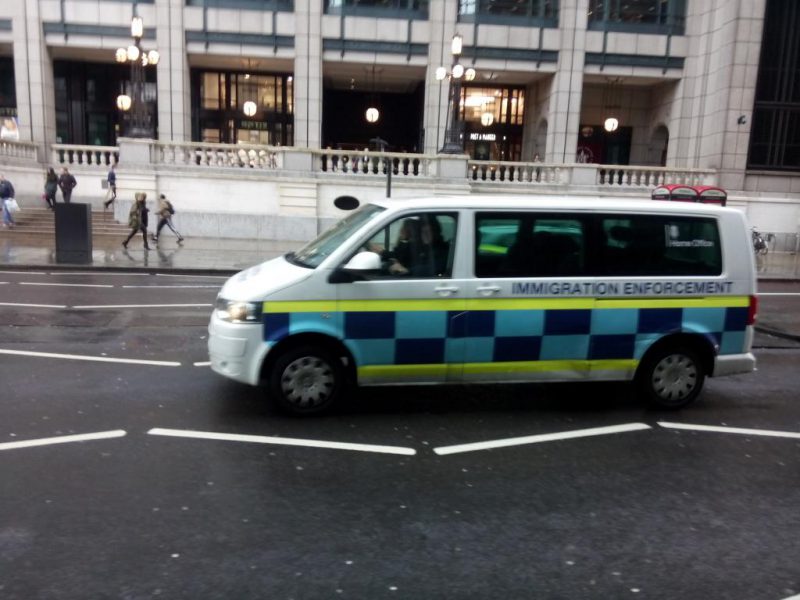This is the third in our series of first-hand accounts by individuals who’ve taken action after spotting an immigration arrest van, also sometimes known as a #racistvan. See here for stories 1 and 2. We think that it’s important that people anonymously share their accounts to inspire & give others courage to challenge immigration raids when they see them happening.
Submitted by anon. on 6/2/17.
I was already running late for a meeting. But then I saw the van: ‘Immigration Enforcement.’ Parked on a residential side street, unaccompanied, I had heard enough about raids to know that one was probably in progress, and that if I waited, a human may be bundled out into that van without ever having known some fundamental rights that could allow them to continue living their life in this country.
So I began waiting. I called to say I’d be late for the meeting, I sent some texts and Tweets out to see if others could join me and I brushed up on the bust card info on the Anti Raids Network site, to make sure I knew what to say and do. The info was relatively simple: film the officers, not those being detained; make sure those being detained know that they have no legal requirement to answer questions and can walk away; pass support phone numbers on to the individual if possible, should they be taken into custody.
A friend arrived after about an hour. There’d still been no action, beyond a few conversations with folks who had clearly also clocked the van with suspicion. One wanted to be able to support and lived nearby. We added each other on Facebook. Once it was two of us, another conversation kicked-off. Another person who said they wanted to help stop these things from happening. We traded numbers.
Shortly after, two Home Office officers came down the street, unaccompanied. They made a comment about us standing there, to see if we were taking a selfie with their van and then got in.
We were both on bikes and decided to follow them. They clearly hadn’t managed to nab anyone in this stop, but we thought they might be heading off to try elsewhere. So we stayed as close as we could. They initially did a loop around on a bunch of side streets, gaging whether we were indeed following them. We made clear that we were, sticking close, making regular eye contact at red lights.
London traffic on a weekday morning worked to our advantage. We nearly lost them a couple of times, but there were enough red lights and gridlock for us to stay close. When they got to Liverpool Street, traffic was at a standstill. I spent an hour tweeting and messaging people and photographing the officers in the vehicle, to at least make sure they knew they were still being watched. Eventually, they peeled off the main road and pulled into the parking lot of Home Office, Beckett House, alongside a dozen other racist vans. I took one last close-up of them as they pulled in, and then headed off.
Were they going to hit up another raid spot but decided to head back to base because they didn’t like the idea of having their dirty work observed? Maybe. Were they simply heading back to the office for their next assignment and we provided an unexpected escort along the way between N15 and SE1? Quite possibly. It is impossible to know if we directly affected their plans in any way that morning.
At the very least though, we removed a bit of their sense of impunity. Too often raids happen because there is no one around to hold the officials to account. The more they feel they are under the microscope when they go out to ruin people’s lives, the more they will have to think about doing so. A few words at the right moment informing someone of their rights, might prevent abuses of the law and might scupper an arrest. The absence of those words too often means someone left sitting in a detention centre, en route back to a country they have tried their best to leave behind.
When the law is unaccountable, it is up to all of us to create accountability ourselves where we can. Any moment when you see a racist van, is a moment you can be a part of that. It might make a fundamental difference in someone’s life, but at the very least it will make those carrying out these forms of state violence a little more aware that they are not free to destroy people’s lives without consequence.
Imagine what would happen if these bullies weren’t able to go out on a raid without being swarmed by observers and those willing to directly intervene in their violence? We shouldn’t lose sight of the fact that we can make their work impossible, wherever we come across them and that in fact, doing so is all of our responsibility.

